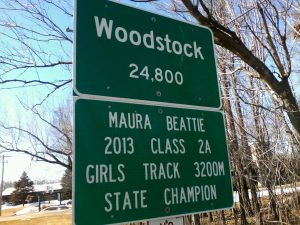Woodstock ponders home-rule retail tax
Gregory Harutunian for Chronicle Media — August 24, 2017
The population total for Woodstock has changed. A special census raised the totals to 25,528 and gave the community a home-rule designation. (Photo by Gregory Harutunian/for Chronicle Media)
As of last January, the city of Woodstock officially received designation as a home-rule municipality after having exceeded a population threshold of 25,000.
The special census, set up and conducted through the latter part of 2015, brought the total residential count to 25,528. The town sought the status as a precursor to having larger control over its own progress.
The city council has acknowledged that road repair is a primary area of concern in attracting new people to the area, and funding sources could require a completely new revenue stream in order to meet the costs. A funding shortfall was also created when the council members decided to decrease its portion of the property tax levy by 10 percent.
At issue for the city council is approval for a 1 percent home-rule sales tax on goods sold in the municipality that could realize nearly $1.2 million in new money. All of the new money will pay for infrastructure repairs and road improvements only. However, the establishment of an additional 1 percent would raise the Woodstock retailer’s occupation tax amount to 8 percent.
The city’s sales tax breakdown currently is 7 percent, with the state of Illinois receiving 6.25 percent and McHenry County taking .75 percent, which includes the Regional Transit Authority portion. The ability to vote on such a proposed measure came with the authority given to home-rule communities. The city council is slated tentatively to discuss the matter as an agenda item, during its Sept. 19 meeting.
Enacted in 1970, the state law defines Illinois municipalities with populations of 25,000 or more will receive a “home-rule” status that creates a local taxing authority and removes many ties to state-mandated limitations regarding the initiation of municipal programs. It also allows an exemption on the annual levy amount above the property tax cap of 5 percent, or the fixed rate of inflation.
“Our current property tax levy amount is 16 percent sales, and the 10 percent reduction will provide tax relief of almost $924,000 to our community,” said Paul Christensen, the city’s assistant city manager, and financial director. “Should the council decide not to participate in the sales tax increase, we would have to find another way to meet that $924,000 gap in our fiscal year budget.
“The increase would offset the tax abatement for our infrastructure needs, and it would be earmarked for those costs,” he said. “The city had home-rule policies in place, before the census. It also affects our PTELL (Property Tax Extension Limitation Law) regarding new growth and the inflation rate.”
The new retail rate, if enacted, is higher than the surrounding towns such as McHenry (7 percent), Crystal Lake (7.75 percent), Harvard (7 percent) and Marengo (7 percent). The unincorporated areas of McHenry County currently charge 7 percent.
“At the public hearing, there were about 20 audience members that made comment on the issue, and there really was no clear consensus on it,” said Christensen. “It’s at the council’s direction, whether to approve or not.”
The special census was approved to escalate a 2010 census count that pegged the city’s population at 24,880. City officials sought the home-rule status as a gateway toward “true self-governance” at the local level. The special census contract with the federal adjunct agency was $90,000. There was approximately $20,000 as a “set aside” in the 2016 fiscal year budget for the expenses of wages paid to local workers, and incidental costs. The city’s fiscal year runs from April 1 through May 31.
About one dozen people undertook the canvassing operation, after training by U.S. Census Bureau representatives that August, and beginning the effort by Sept. 1. Woodstock officials had considered the prospect of a special census in early 2015, as a response to Gov. Bruce Rauner, cutting half the local government distributive fund (LGDF), and the 8 percent share of the collected state income tax calculated on a per capita baseline.
A certified increase in population would also raise the municipality’s revenue share. The state of Illinois reimburses nearly $151.40 annually to municipalities for each resident, and could mean an additional $100,000 each year for Woodstock.
City Manager Roscoe Stelford had also said that perceptions of a “home-rule” status equating to tax enhancement vehicle were incorrect, since elected officials also live in the community and the main consideration was “local representation.”
–Woodstock ponders home-rule retail tax–







